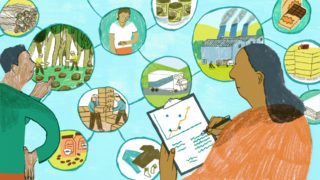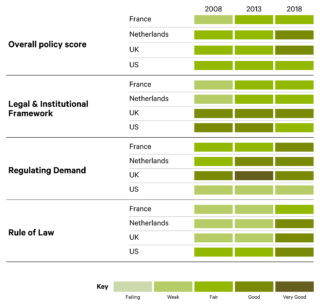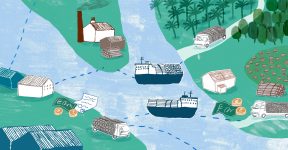
Building Sustainable Supply Chains: Lessons from the Timber Trade
Progress towards tackling illegal logging continues to be made in France, the Netherlands, the United Kingdom and the United States, but as governments explore building sustainable supply chains for other commodities, it is important to not lose sight of the lessons learned from the timber trade, writes Adelaide Glover.
The latest Chatham House forest policy assessment for four key consumer countries – France, the Netherlands, the UK and the US – reveals that, since 2013, progress has been made towards tackling illegal logging and the related trade although room for improvement still remains.
Government efforts across the board have improved in terms of international engagement and law enforcement albeit to varying degrees. There has also been continued cooperation with producer countries as well as the strengthened enforcement of regulations to control the import and sale of illegal timber.
However, there are still areas that need improvement such as ensuring high-level policy commitments are maintained and that progress is systematically monitored. Furthermore, in the European countries surveyed, the monitoring and implementation of timber public procurement policies needs strengthening – a policy area that could also be utilized in the US.

One common thread among all four countries analysed is the existence of legally binding regulations prohibiting the import of illegal timber and paper products.
In the EU, for example, under the Forest Law Enforcement, Governance and Trade (FLEGT) Action Plan, the EU Timber Regulation (EUTR) prohibits illegal timber and paper products from being placed on the European market. The UK government has also incorporated the EUTR into UK law in preparation for leaving the EU. Similarly, in the US, the 2008 Lacey Act prohibits the trade in timber and associated wood products.
Both regulations provide essential tools in helping to ensure supply chains are free from illegal timber and paper products. Enforcement of these regulations has been strengthened in recent years in all four countries which has, in large part, been a strategic decision: the introduction of stricter enforcement measures, implemented gradually, has allowed businesses to adapt to the updated legal requirements. In addition, through training, cooperation and experience, enforcement agencies have increased their understanding of the forest sector and the most common types of illegal practices thereby improving the effectiveness of their response.
However, challenges remain, particularly with respect to the sanctions regime. In France, for example, enforcement efforts have been hampered by a lack of capacity on the part of officials, and while penalties are generally considered dissuasive, just a few importers have faced penalties so far.
Similarly, in the Netherlands, the government has been criticised for taking too soft an approach in applying sanctions.
In contrast, enforcement efforts in the UK have been among the most active in Europe although it has been suggested that a greater range of civil sanctions would be helpful to allow for a more proportionate approach.
Similarly, in the US, the high burden of proof required for criminal enforcement actions under the Lacey Act has meant the number of such cases has been relatively low.
France, the Netherlands, the UK and the US also share another common thread: the intention to strengthen their efforts to tackle unsustainable practices in the supply chains of other commodities.
In the EU, European Commissioner for Justice, Didier Reynders, has announced plans to introduce legislation on mandatory supply chain due diligence for EU companies as part of the Commission’s 2021 Work Plan and the European Green Deal. The due diligence requirements will aim to identify, mitigate and account for environmental and human rights abuses in all supply chains with sanctions for non-compliance set to be put in place.
In 2017, France introduced legislation requiring large companies to implement due diligence to avoid environmental damage and human rights abuses in their supply chains. In 2018, it also established a National Strategy Against Imported Deforestation (SNDI) which aims to develop a more comprehensive suite of measures and to push for action at EU level.
The Dutch government, too, is drawing up a sustainability framework applicable to all imported biomass – not just timber – for all uses including energy and construction.
In the UK, the Global Resources Initiative is also seeking to ensure the UK’s global commodity supply chain footprint is sustainable thereby avoiding deforestation and other environmental degradation and supporting jobs, livelihoods and investment in resilient and sustainable food systems. The UK government is also currently considering the recommendations of a task force commissioned to identify possible measures to help towards this goal.
In the US, several members of Congress are planning to introduce federal legislation in 2021 designed to make it illegal for companies to import products linked to illegal deforestation. At the subnational level, too, legislation has been proposed in the state of California that would require government suppliers to make commitments to halting deforestation and the exploitation of workers in their supply chains.
As political momentum grows for building sustainable commodity supply chains, it is crucial that existing best practices from the timber sector are not overlooked. Based on our latest policy research on the timber supply chains of France, the Netherlands, the UK and the US, the following lessons should be considered:
- It is critical to have a multi-pronged approach that will not only shift demand to sustainable products but will also provide support for producer and processor countries’ efforts to improve sustainability in their production and manufacturing sectors.
- Thorough supply chain analysis is necessary to ensure measures are just and support vulnerable communities including women and girls and indigenous peoples.
- Engagement with, and training for, the private sector in both producer and consumer countries is imperative.
- Monitoring and enforcement of any legislation should be well-resourced and the sanctions regime needs to be well-measured with an appropriate range of penalties so that these are both dissuasive and enforceable.
While governments seek to strengthen their efforts to support sustainable supply chains for a range of commodities, attention must not be deflected from existing efforts to support a legal and sustainable forest sector. Any new regime must reinforce existing measures in the timber trade, in doing so, there is a real opportunity to make rapid progress towards shifting to sustainable practices for all land-use sectors around the world.


